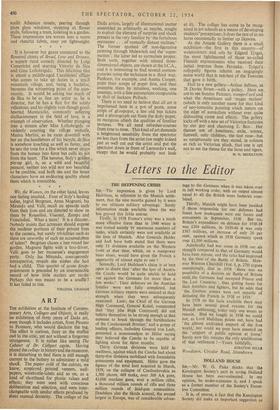Letters to the Editor
THE DEEPENING CRISIS
Sta,—The impression is given by Lord Hailsham, in reference to the Munich settle- ment, that the nine months gained by it were to our ultimate military advantage. Surely information made available since the war has proved this fable untrue.
Firstly, in 1938 France's army was a much more effective force than in 1940 when it was routed mainly by enormous numbers of tanks, which certainly were not available at the time of Munich. Also Generals Halder and Jodl have both stated that there were only 13 divisions available on the Western front at that time, which, on a manpower basis alone, would have given the French a superiority of almost eight to one !
Secondly, Lord Hailsham's claim is at best open to doubt that after the loss of Austria the Czechs would be quite unable to hold out against the Germans for more than a few weeks.' Their defences on the Austrian 'frontier were not fully completed, but German military experts were amazed at their strength when they were subsequently examined. Later, the Chief of the German High Command, General Keitel, commented that ' they [the High Command] did not believe themselves to be strong enough at that moment to break through the fortifications of the Czechoslovak frontier,' and a group of leading officers, including General von Leeb, presented a memorandum to Hitler saying they believed the Czechs to be capable of fighting alone for three months.
Thirty German divisions were held In readiness, against which the Czechs had about thirty-five divisions mobilised with formidable armaments and equipment. Hitler gave the figures of the total loot acquired in March, 1939, on the collapse of Czechoslovakia as 1,500 planes, 469 tanks, over 500 AA guns, 43,000 machine guns, over a million rifles, a thousand million rounds of rifle and three million rounds of field-gun ammunition. Doubtless also the Skoda arsenal, the second largest in Europe, was of considerable advan-
tage to the Germans when it was taken over in full working order, with an output almost equal to all the British arms factories com- bined.
Thirdly, Munich might have been justified if those responsible for our defences had learnt how inadequate were our forces and armaments in September, 1938. But no, Britain's expenditure on defence for 1938-39 was £304 millions, in 1939-40 it was only £367 millions, an increase of only 20 per cent., against which in 1938 Germany spent over £1,500 millions, Admittedly had war come in 1938 our air strength compared to that of Germany would have been minute, and the ratio had improved
by the time of the Battle of Britain. How- ever Winston Churchill (Vol. I, p. 279) argues
convincingly, that in 1938 ' there was no possibility of a decisive air Battle of Britain until the Germans had occupied France and
the Low Countries ', thus getting bases for their bombers and fighters, but he adds that ' the German armies were not capable of defeating the French in 1938 or 1939.'
In 1938 on the facts available there may have been several good reasons for the Munich settlement;_ today only one seems to
remain. Had we fought in 1938 we could not, as Lord Hailsham points out, have had
' the almost undivided support of the free world,' nor could we even have counted on the support of public opinion at home.' Surely now this remains the only qualification of that settlement I—Yours faithfully,
STRATTON MILLS
Woodlawn. Circular Road, Strandtown


































 Previous page
Previous page